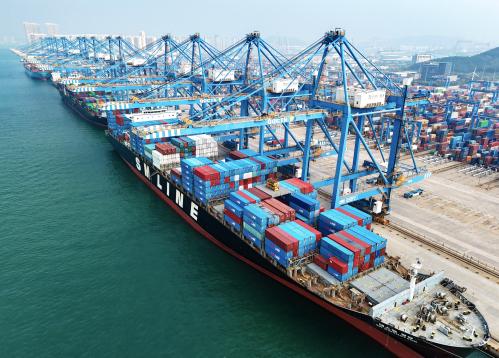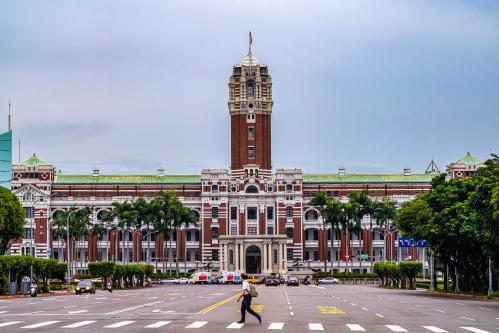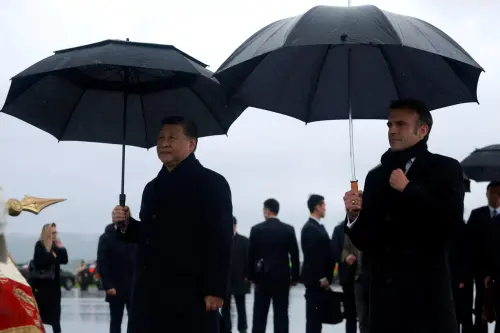The U.S.-China relationship in recent months has shown signs of stabilizing, at least on the surface. Several factors have contributed to this seeming flattening of the trajectory of relations. First, there is alignment in expectations. Neither Washington nor Beijing holds false hopes of breakthroughs or dramatic improvements in relations. Second, leaders in both countries — each for their own reasons — see the benefit of capping tensions at current levels. And third, advisors to President Joe Biden and President Xi Jinping have held intensive consultations since June to set the stage for a meeting between both leaders on the margins of the Asia-Pacific Economic Cooperation leader’s summit in mid-November in San Francisco.
The resumption of U.S.-China high-level engagement has restored several habits that previously supported stability and predictability in relations. These include a reciprocal commitment to “no surprises” for managing relations. Even as both sides continue to take actions they view as protective but the other side views as unfriendly, they have each previewed their actions privately to the other side in advance to clarify the intentions and limits of their respective approaches. Both sides have set up diplomatic channels to address specific issues, such as export controls, commercial issues, and strategic concerns. Washington and Beijing also have resumed coordinating with each other on global crises, such as following the outbreak of conflict between Israel and Hamas.
Under the surface, though, tensions continue to boil. Neither side has resolved nor lessened any significant challenges in the relationship. Increased frequency of communication has not yielded convergence around key issues. Instead, the relationship has settled into a period of communication without concessions in either direction.
This is the atmosphere in which Biden and Xi will sit down with each other in November. The meeting will afford both leaders an opportunity to demonstrate statesmanship at a time of heightened volatility in the international system.
It remains too soon to tell whether both leaders will be able to demonstrate that diplomacy delivers results. With creativity, though, there is an opportunity for both sides to get much of what they most seek by reviving the timeworn practice of trading form for substance.
China’s goals for the meeting
For Beijing, optics are ever important. Chinese officials will want to project to their domestic audience that Xi is received by Biden with dignity and respect. They will be interested in highlighting both leaders engaging amicably with each other and investing personally in guiding the relationship. Accomplishing this will require imagery of both leaders interacting on a personal basis beyond the customary handshake in front of a bank of flags in a hotel conference room. Such visuals could be achieved by having both leaders take a brief walk together, share a meal, or simply converse with each other one-on-one away from a formal delegation-style meeting.
Every indication suggests Xi’s view of U.S. intentions toward China remains quite dim. For tactical reasons, though, Xi would prefer to project capacity to stabilize relations. Particularly when Xi faces a confidence deficit inside China for overseeing a softening economy and increasingly strained foreign relations, the image of Xi being accorded more than a customary meeting with Biden will hold added value for him. It will give Beijing an opportunity to show a domestic audience that Xi remains capable of recalibrating relations with the United States, a step that many in Beijing view as key for China’s ability to manage relations with U.S. allies in Asia, Europe, and elsewhere.
With an election in Taiwan looming in January 2024, Beijing appears to be trying to tip the scales in its preferred direction. Xi will seek clarification from Biden that the United States does not favor any candidate or political party in Taiwan. He will seek reassurance that the United States does not support Taiwan independence. Biden should privately reiterate the United States’ longstanding policy — Washington does not support Taiwan independence and opposes any unilateral changes to the status quo in the Taiwan Strait. Washington also opposes outside interference in Taiwan’s electoral process. Biden should stress to Xi that the views of Taiwan’s more than 23 million people will be decisive to Taiwan’s future, and if China wants to pull Taiwan closer, it should focus on addressing Taiwan’s top interests and concerns.
America’s objectives for the meeting
In return, the United States will want to lock in concrete progress on its priorities, foremost among them reducing the flow of fentanyl precursor chemicals from China. Fentanyl-related deaths are now the leading cause of death for Americans from the ages of 18-45. This scourge touches every congressional district and community in America.
China deserves credit for classifying fentanyl as a banned substance in 2019. This decision, which President Donald Trump successfully lobbied President Xi to take, saved American lives. Unfortunately, a handful of pharmaceutical companies in China have since designed precursor chemicals that are not covered by the 2019 fentanyl ban. These precursor chemicals are being sold openly and making their way to Mexico, where drug cartels are mixing them with fentanyl and then smuggling the lethal drugs into the United States. It would be impactful if Biden and Xi could agree to instruct their law enforcement agencies to take concrete and robust steps to counter precursor flows. Unlocking durable progress along these lines may require Washington to delist the Chinese Ministry of Public Security’s Institute of Forensic Science from Trump-era sanctions, a decision the Biden administration should be prepared to take in service of saving American lives.
Additionally, the United States and China are the world’s two leaders in artificial intelligence (AI). They both would benefit from establishing a channel to exchange views on AI governance and safety. It also would be mutually beneficial for both leaders to affirm the value of having each other’s students, scholars, scientists, artists, athletes, and subnational leaders in more regular contact with each other. They could agree to expand flight routes, make visa processes simpler, and encourage exchanges in both directions for law-abiding citizens.
The United States and China also possess unique capacities to address human suffering. Previously, both countries coordinated responses to crises ranging from the global financial crisis to conflict in Sudan and the outbreak of Ebola in West Africa. Both countries’ baleful responses to COVID-19 demonstrated the consequences of failure to jointly confront common challenges. The United States and China once again have an opportunity to demonstrate leadership with wars raging in Ukraine and Israel/Gaza. They could agree to strengthen coordination on the delivery of humanitarian assistance to Palestinians, unimpeded movement of grain through the Black Sea, and reconstruction plans in Ukraine and Gaza. Given their unique leverage with different actors in both conflicts, they also could coordinate efforts to limit escalation and the expansion of violence in either theater.
Beyond such specific issues, though, both leaders have an opportunity to use this meeting to create a lasting impact by setting a direction for the bilateral relationship for the year ahead. With presidential elections approaching in the United States in 2024, it is unlikely the two leaders will meet in person in the year ahead. The absence of leader-level face-to-face interaction will increase the premium on ensuring that both leaders’ advisors understand their marching orders for managing relations.
Countering the critics
Some members of Congress, presidential hopefuls, and commentators can be expected to argue that the United States is being played by China — caught in an engagement trap of substituting meetings for action to protect Americans against Chinese predation. This analysis will be loud and wrong. Here’s why:
The United States is continuing to strengthen its competitive position even as it rebuilds diplomatic connections with China. The United States is tightening its alliance relationships in Asia and Europe to address challenges posed by China. Washington also is strengthening export controls, investment restrictions, and military deterrence in Asia.
The United States remains the stronger power in the relationship by a significant margin. It can afford magnanimity. Washington’s task is not to slow Beijing down. Only Chinese can do that, and Beijing is doing a decent job of it currently. Washington’s job is to chart a direction for the relationship that serves U.S. interests. Lowering the risk of inadvertent crises and eliciting greater Chinese contributions to global challenges does just that.
Biden is a pragmatist and a politician. He surely will understand that a strong majority of Americans want the U.S. approach toward China to be firm, smart, and diplomatic. According to recent polling by National Security Action and Foreign Policy for America, 73% of Americans support high-level diplomatic talks with China. Only 13% want an aggressive approach and 5% want a confrontational one. Seventy-eight percent of Americans want their leaders to focus more on working to avoid a military conflict with China, while only 22% say leaders should focus more on preparing for one.
Stabilizing relations with China while remaining firm in defense of U.S. interests and values would enjoy broad public support within the United States. Likewise, Xi would benefit in China if he can demonstrate progress in recalibrating relations with the United States.
Both leaders have an opportunity to advance their respective interests when they meet in San Francisco. Time will tell whether they prove capable of seizing it.







Commentary
Is progress possible when Biden and Xi meet?
October 25, 2023